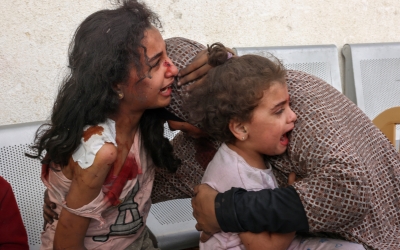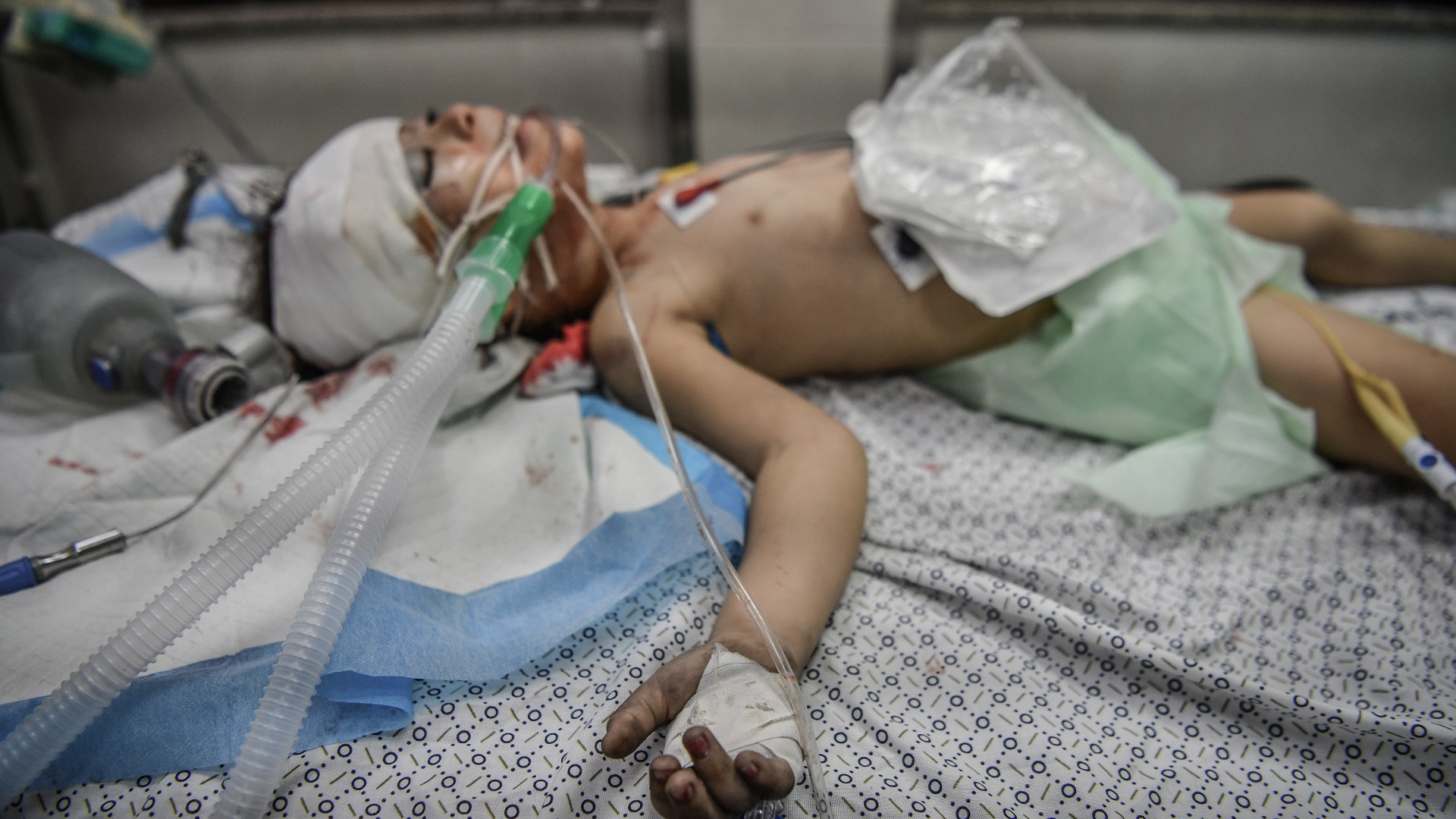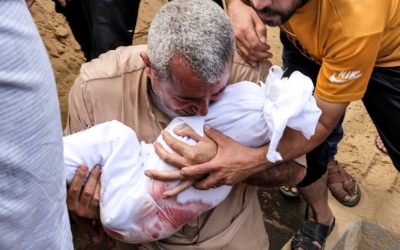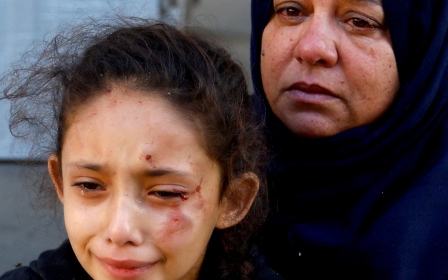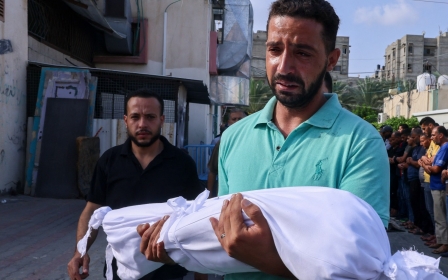Israel-Palestine war: Israel's slaughter of civilians in Gaza lays bare its genocidal intent
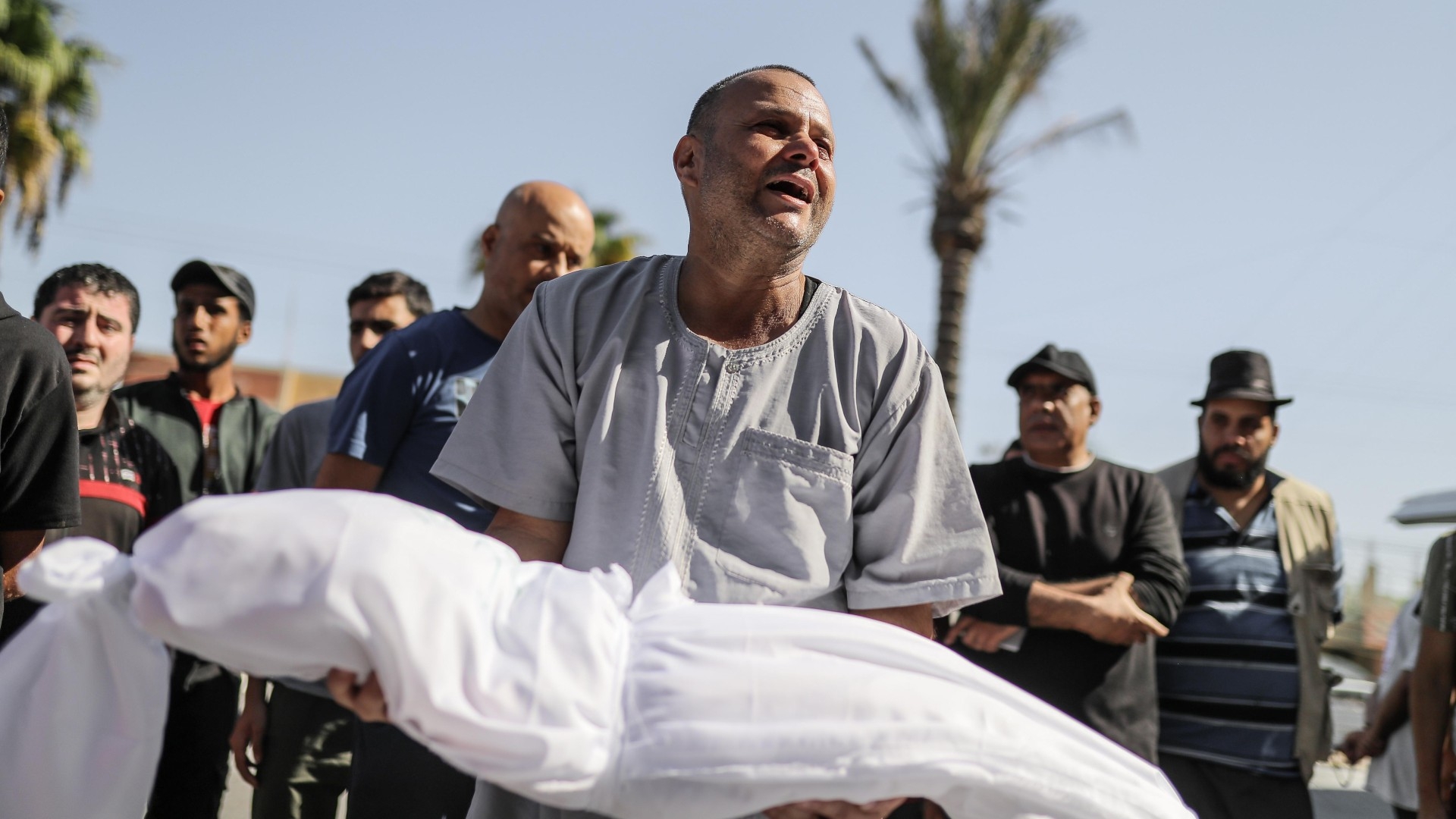
The present war in Gaza should come as a surprise to no one. This highly publicised explosion of the Gaza Strip has been years in the making and is telling of the people's despair to break Israel's 16-year siege.
Moreover, Israel's response has been consistent in its brutality, and Palestinians in Gaza are all too familiar with the genocidal intent and warfare that Israel continues to put on full display.
Here, five Palestinian academics and researchers give their opinions on the ongoing conflict.
Ben Gvir and Smotrich are normalised | Mouin Rabbani
Mouin Rabbani is a co-editor of Jadaliyya and a non-resident fellow at the Center for Conflict and Humanitarian Studies.
"The US and Europe give Israel free hand in Gaza", read the headline from Globes, Israel's financial daily, published the day before US President Joe Biden delivered remarks at the White House indicating that, rather than giving Israel a free hand, he considers the United States a full and active partner in its systematic destruction of the besieged strip.
Even by US standards, it was an extraordinary speech. Hamas, according to Biden, exists for the sole purpose of killing Jews. He even placed Operation Al-Aqsa Storm, Hamas's term for its opening attack on 7 October, firmly in the context of the Holocaust and the Islamic State group, thereby denying any relationship between the Palestinian fighters' attack against Israel and Israeli policies towards the Palestinians, with which he is all too familiar.
Biden devoted a substantial portion of his remarks to denouncing attacks against civilian non-combatants, or rather against Israeli civilians and them alone. The mass killings of Palestinian civilians and the razing of entire neighbourhoods with high explosives was waved away with the claim that, unlike Hamas, Israel "upholds the laws of war".
Follow Middle East Eye's live coverage for the latest on the Israel-Palestine war
Before concluding with an anecdote about Golda Meir, which seemed to suggest both he and she were fully aware of Egypt and Syria's impending launch of the 1973 October war, Biden made a number of statements emphasising that during the current crisis there is no daylight between the White House and Israeli Prime Minister Benjamin Netanyahu.
Right-wing government ministers Itamar Ben Gvir and Bezalel Smotrich have, as predicted, been normalised.
Biden emphasised that Israel will get all the high explosives and support it needs, without any strings of any sort attached, to achieve the objectives its leadership chooses.
This was received in Israel as a licence to not only continue but to escalate yet further, and it is inconceivable that the White House is not fully aware of this. Predictably, that same evening the Al-Karama neighbourhood of Gaza city was vaporised, with rescue teams indicating that the scale of the destruction had thoroughly overwhelmed their capacities.
Yet, as Israel shut off the food, water, medicine, and electricity supply to the Gaza Strip, and as Israeli leaders issued increasingly genocidal threats, their torment of Gaza's long-suffering population failed to conceal their military ineptitude, even from Biden.
Washington's dispatch of an aircraft carrier group to the eastern Mediterranean to deter Hezbollah from opening a second front in solidarity with the Palestinians demonstrates that Washington, too, has concluded that Israel is no longer capable of defending itself without massive foreign assistance and involvement.
The perfect victim | Ghassan Elkahlout
Ghassan Elkahlout is the director of the Qatar-based Center for Conflict and Humanitarian Studies and an associate professor at the Doha Institute for Graduate Studies.
As a Palestinian who grew up within the confines of a refugee camp in the Gaza Strip, I find it imperative to share some reflections on the ongoing war in Gaza. It is indigestible to witness the international community's overt and clear selectivity in addressing and condemning global injustices.
The international community's shock and ensuing engagement with the discourse displays a profound misunderstanding of the situation. They have had numerous opportunities to grasp the nature of the "conflict", engage in meaningful dialogue, and exert pressure on the Israeli government to alter its actions. Yet, they have repeatedly chosen inaction.
False allegations about Palestinians have stirred greater outrage than documented Israeli crimes against Gaza's children. Palestinians seemingly must be "perfect victims" to garner sympathy, but often, even when fitting this mould, they are sidelined and forgotten.
Indeed, attacking civilians cannot be glorified. The necessity to shield civilians is paramount. Yet, my anguish stems from the glaring double standard when addressing Palestinian civilians.
It isn't a mere "war tactic" to deprive an entire population of essentials like food, water, electricity and medical aid, amounting to a concentrated assault on Gaza's residents.
The global community's silence is resounding, and the Palestinians have undoubtedly perceived this indifference.
Moreover, there is an urgent imperative to meticulously document each Israeli strike. War crimes, which seem evident, have been repeatedly perpetrated, and Israel must be held to account under international humanitarian law.
The Israeli government, alarmingly, seems determined to normalise such war crimes for the Palestinians in Gaza within its wider effort to erase Palestine and the Palestinian people from the map. This cycle will persist until the Israeli populace and its political establishment feel they have exacted a sufficiently ghastly toll on Palestinian lives to satiate their appetite for revenge - perhaps until there are no more Palestinians.
The world must take notice, intervene, and advocate for justice and accountability.
Hezbollah's entanglement | Amena ElAshkar
Amena ElAshkar is a research assistant at the Center for Conflict and Humanitarian Studies.
For a tense 90 minutes, millions of Israeli settlers residing in the northern part of historic Palestine, near the Lebanese border, were gripped by fear due to reports of a significant drone attack and possible infiltration attempts emanating from southern Lebanon.
However, the Israeli army later acknowledged that the incident was a false alarm stemming from a human error. The attack executed by Palestinian fighters from Gaza last week has indeed kept the Israeli defence system on its toes.
The involvement of Hezbollah in this round could be a game-changer
With the unfolding events in Gaza, eyes have shifted towards southern Lebanon, or Israel's northern frontier. It is evident that this frontier has seen escalations, raising pertinent questions - will the Lebanese Hezbollah open a new front and join the war against Israel?
The root of such speculation primarily lies in Hezbollah's allegiance to what is termed the "Axis of Resistance". Moreover, discussions over the past few months concerning the "unification of the fronts" suggest a closer collaboration amongst resistance groups like Hezbollah, Hamas, and Palestinian Islamic Jihad, along with an array of other factions backed by Iran in Iraq, Syria and Yemen.
Given this backdrop, it would have been a tall order for Hezbollah to stand idle whilst the Israeli government launches its vicious offensive against the Palestinians in Gaza under the notion of trying to eradicate Hamas and its infrastructure.
Indeed, the involvement of Hezbollah in this round could be a game-changer, primarily due to the group's advanced military infrastructure, which could potentially widen the scope of the regional conflict, especially considering Hezbollah's backing from Iran.
This is further accentuated by the open support from European nations for the Israeli government and the US military backing for its defence systems.
The Wall Street Journal last week reported a tight-knit collaboration amongst Iran, Hezbollah and Hamas in planning the attacks that began on 7 October. If this report holds true, it suggests a level of meticulous planning and coordination, likely leading to an agreement on what would constitute "red lines" regarding Israeli retaliation.
Speculation indicates these red lines to be somewhat related to the possible Israeli ground offensive in Gaza and if the US decides to become directly involved in the conflict. Crossing these lines would likely trigger Hezbollah's involvement, as well as that of other actors in the region, in the ongoing war.
This sentiment was essentially reaffirmed in an article published by the pro-Hezbollah Al-Akhbar daily in Beirut on 9 October. The piece noted that "the forces of the Axis of Resistance established a specific threshold concerning the red lines, which are known to the adversary. Crossing these thresholds under any circumstances could ignite the fronts, perhaps simultaneously."
As this war seems to drag on, there is great speculation as to whether any red lines will be crossed and, consequently, any regional actors will be joining the fold.
An inevitable crisis | Tamer Qarmout
The root causes of the current crisis in the Gaza Strip are the maintenance and continuation of the Israeli occupation and its apartheid system combined with the consistent failure of the international community to effectively revive the peace process.
The reality is that the Palestinians of Gaza seek freedom and are willing to demand it no matter the cost. They have been strangulated for far too long by this unjust occupation and face no other choice.
It was inevitable that the status quo would be radically, and possibly violently, challenged given that it was always unsustainable
Operation Al Aqsa Storm has damaged the pride of Israelis and shattered their sense of security. It seems that the Israeli government has now chosen to wipe out Gaza, with the looming prospect of a ground invasion. In doing so, it raises the stakes of the crisis and prompts many questions.
If Israel seeks to topple the de facto authorities in the Gaza Strip, then do they know who will take over? If an invasion triggers an expected third wave of mass displacement, where will the uprooted population of Gaza go next?
Yet we also cannot assume that any Israeli invasion would be successful.
Hamas may indeed have sought to drag Israel into Gaza, given the former's strengths in guerrilla and irregular warfare. Conventional warfare is clearly outdated and would play into the hands of the Israeli army. Hamas has seemingly also sought to remind the various regional and international actors that it will not accept being sidelined, particularly as Arab states move to normalise relations with Israel.
Evidently, Hamas is laying the foundations of a new resistance approach given the breakdown of the post-Oslo process.
It is also crucial to view the current crisis within a historical context of missed opportunities for constructive engagement. The international community isolated Hamas and, by extension, the Gaza Strip, when it won free and democratic elections there.
Since then, Israel and the United States have effectively vetoed intra-Palestinian reconciliation, rejecting the role of Hamas in any unity government that could offer an effective platform for governance in the occupied territories and a cohesive voice within peace talks with Israel.
Yet now the international community stands surprised that Gaza and its 2.5 million residents perhaps will not sit idly awaiting a slow death at the hands of their occupiers.
The disenfranchisement of Hamas early on, when it sought power peacefully and democratically, was a pivotal moment on the path to the events of today. It was inevitable that the status quo would be radically, and possibly violently, challenged given that it was always unsustainable.
Tamer Qarmout is an assistant professor of public policy at the Doha Institute for Graduate Studies.
Collapse of the iron wall | Tariq Dana
Tariq Dana is an assistant professor of conflict and humanitarian studies at the Doha Institute for Graduate Studies. He is also a policy adviser for Al-Shabaka: The Palestinian Policy Network.
The recent Palestinian military operation represents a shattering of long-held Israeli strategic dominance.
Decades of policy sought to create an "iron wall" of military superiority that would deter Palestinian resistance through disproportionate retaliation. However, this doctrine of asymmetric deterrence now lies in ruins.
The scale and audacity of the resistance factions' attack reveal the futility of Israel's vaunted security architecture. Sophisticated infiltration and coordinated manoeuvres crushed billions spent on military and security fortifications along the enclaved Gaza Strip meant to enforce the inhuman blockade.
This collapse of seemingly formidable defences cracked Israeli deterrence doctrine. It demonstrated the ability of Palestinian resistance to creatively absorb potential costs and still shape strategic outcomes.
The operation's shock is even more psychologically devastating because military prowess is inextricably tied to the Israeli national psyche. The military establishment wields tremendous influence peddling militarism as essential to the preservation of the Zionist settler-colonial project.
As the ostensible invincibility underpinning Israeli military dominance has been deeply shaken, this has already resulted in devastating consequences for Israel's "central organisational principle": the army, which lies at the core of the Israeli militarised worldview and sense of identity.
In the broader context, any future regional order must recognise that the Palestinian struggle remains central and unbowed. Despite efforts to dismiss or marginalise it by the US client states in the region, the Palestinian cause retains its focal resonance and moral weight.
The quest for Palestinian justice and self-determination will persist in influencing the geopolitical dynamics of the Middle East. Any diplomatic calculations or partnerships built without addressing the Palestinian quest for justice and self-determination are destined to founder.
The recent offensive highlights that, while military balances may shift, the Palestinian cause remains pivotal to achieving a just and lasting peace. Its righteous persistence will keep cracking walls, both literal and metaphorical, until freedom and dignity prevail.
The views expressed in this article belong to the authors and do not necessarily reflect the editorial policy of Middle East Eye.
Middle East Eye propose une couverture et une analyse indépendantes et incomparables du Moyen-Orient, de l’Afrique du Nord et d’autres régions du monde. Pour en savoir plus sur la reprise de ce contenu et les frais qui s’appliquent, veuillez remplir ce formulaire [en anglais]. Pour en savoir plus sur MEE, cliquez ici [en anglais].



